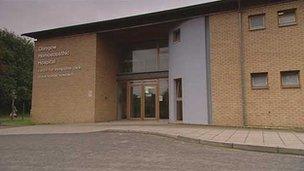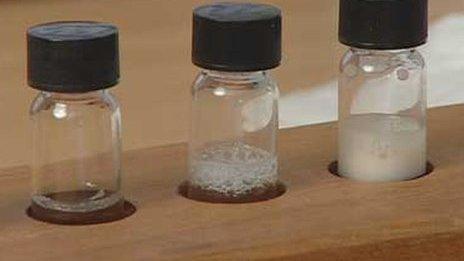Should the NHS pay for homeopathy?
- Published

Homeopathy uses very diluted substances which are given orally, often on a pill
NHS Lothian is considering whether it should continue to pay for homeopathy services. Those against complain that it has no scientific backing and any positive results are due to the "placebo" effect. But homeopathy has ardent supporters who say it has helped them get better and insist it should be available on the NHS.
Homeopathy is a 200-year-old system of treatment that uses very highly diluted substances which are given orally in the belief that they will stimulate the body's self-healing mechanism.
Detractors such as Keir Liddle of Edinburgh Skeptics say homeopathy is "against all the laws of physics and chemistry" because the initial ingredients are so diluted that all that is left is a "memory" in the water.
The British Medical Association, which represents doctors, believes there should be no further NHS funding for homeopathy, saying it is concerned that scarce resources are being spent on a treatment with "no scientific evidence base to support its use".
Annual budget
But the Faculty of Homeopathy says it is "not accurate" to say there is no evidence for homeopathy.
Dr Sara Eames, president of the faculty, claims that the conclusions drawn from studies have been "cherry-picked" by opponents and that there is evidence for the effectiveness of its treatments.
She also claims that homeopathy is a safe, cost-effective alternative which can actually save the NHS money.
The Scottish government says it is up to NHS boards to decide whether to offer homeopathy, "based on an assessment of needs within their respective areas".
NHS Lothian's consultation is about homeopathy and not about herbal remedies.
The health board spends £240,000 a year providing homeopathy services, which is 0.017% of its annual budget.
It has launched a consultation on whether it should follow NHS Highland, which removed its funding 2010.

Many patients are referred to the Glasgow Homeopathic Hospital
NHS Highland director of public health Dr Margaret Somerville said at the time there was "no evidence" that the remedies worked.
Dr Somerville said there was "settled, clear and unambiguous clinical opinion" that homeopathic treatments should not be used in the NHS.
The NHS Lothian consultation document, released ahead of its first public meeting in Musselburgh on Thursday, says many clinical trials have been conducted to test whether homeopathic remedies are effective.
It says studies, such as the 2010 report by the cross-party House of Commons Science and Technology Committee, had found there was no evidence beyond a placebo effect - where a patient gets better because of their belief that the treatment works.
Drugs regulator
The Commons committee said using public money on the highly-diluted remedies could not be justified.
The MPs also criticised the drugs regulator, the Medicines and Healthcare products Regulatory Agency, for allowing medical claims to be made.
The bar for licensing for homeopathic remedies is not set as high as for medical treatments, partly because they have been used since the NHS was set up in 1948, before the current system of regulation was brought in.
But manufacturers and supporters of homeopathy dispute the report, saying the MPs ignored important evidence.
Dr Eames, from the Faculty of Homeopathy, says the committee was "not a scientific body".
"We didn't feel it was very fair or unbiased and it certainly has no scientific foundation," she says.
Dr Eames also says that, within the NHS, homeopaths tended to treat "medically-unexplained conditions" and many patients were referred after conventional medicine had failed to improve their problems.
She says conditions they deal with are not easy to diagnose or difficult to treat and often had "multiple pathologies".
Dr Eames says the complicated nature of the conditions also made it difficult to research the effectiveness of homeopathy in control trials, as studies worked better when concentrating on one problem.
She says: "The conditions for which the random control trials evidence comes out strongly are fibromyalgia, which is a chronic pain, insomnia, flu, allergies, sinusitis - bothersome things.
"It comes out clearly in research that homeopathy is better than placebo for conditions like that," says Ms Eames.

Substances such as herbs and minerals are heavily diluted to make homeopathic treatments
Margaret Watt, from Scotland Patients' Association, which seeks to give people an opportunity to raise concerns about healthcare, says she believes access to homeopathic treatments is a "human right".
She says: "There are a lot of people who believe in the complementary and homeopathic side of things. It is a human right. If they don't want to take conventional medicine then they should be given an alternative."
Miss Watt says she cannot take conventional drugs because of a "multi-allergy syndrome".
She says: "I know homeopathy works because I've been on it for more than 30 years. That was all I ever took until May this year when I took problems with my heart.
"I'm 74 this week and I have managed to get through my life on complementary and homeopathic treatments."
Miss Watt adds: "The number of people who get comfort from the fact that they go and get the homeopathic, the complementary, the integrated care at the homeopathic hospitals, that in itself makes these people positive. It makes them have a positive view on life."
However, Mr Liddle, chair of the Edinburgh Skeptics, a society which promotes "science, reason and independent thinking", says homeopathy is "not effective and not efficient, which is at odds with the NHS health care strategy".
He says: "A substance with nothing in it cannot possibly meet those demands.
"Apart from that, it is unethical for a health care service to prescribe something they know is nothing better than a placebo because that means GPs are put in a position where they end up lying to patients, which is a position which is untenable ethically and morally, in our opinion.
"Where applicable the treatments offered to patients in the health service should be evidence-based. They should be proved to be safe and effective in order that we are not wasting money treating people with things that don't work."